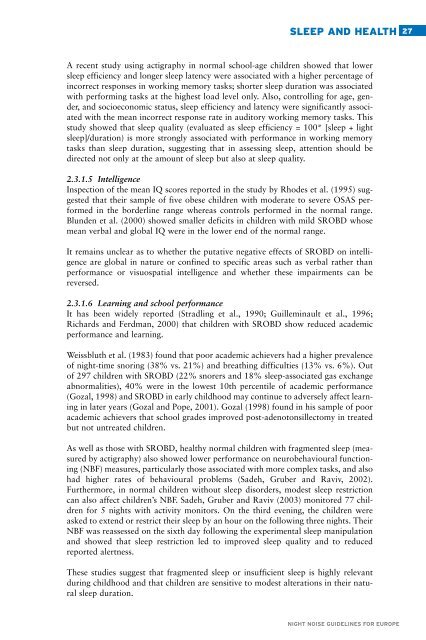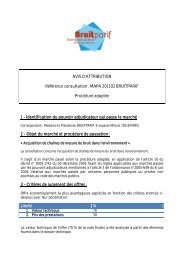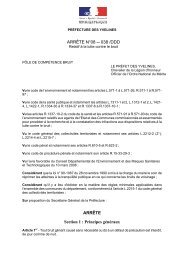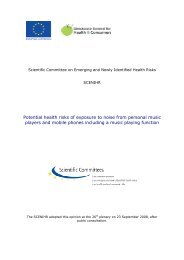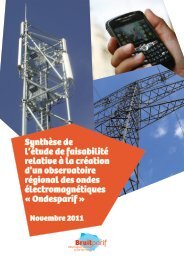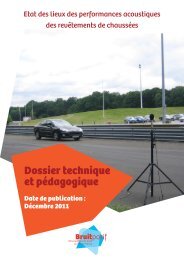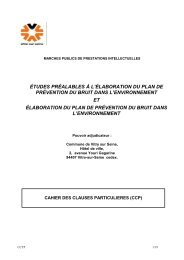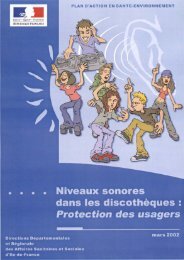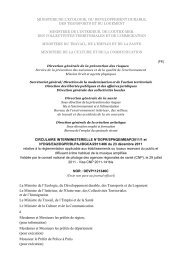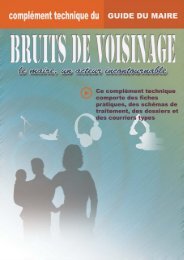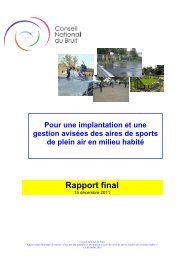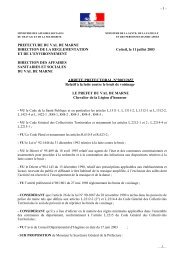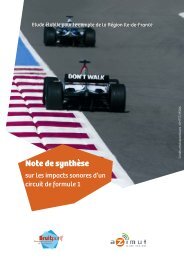Night noise guidelines for Europe - WHO/Europe - World Health ...
Night noise guidelines for Europe - WHO/Europe - World Health ...
Night noise guidelines for Europe - WHO/Europe - World Health ...
You also want an ePaper? Increase the reach of your titles
YUMPU automatically turns print PDFs into web optimized ePapers that Google loves.
SLEEP AND HEALTH 27<br />
A recent study using actigraphy in normal school-age children showed that lower<br />
sleep efficiency and longer sleep latency were associated with a higher percentage of<br />
incorrect responses in working memory tasks; shorter sleep duration was associated<br />
with per<strong>for</strong>ming tasks at the highest load level only. Also, controlling <strong>for</strong> age, gender,<br />
and socioeconomic status, sleep efficiency and latency were significantly associated<br />
with the mean incorrect response rate in auditory working memory tasks. This<br />
study showed that sleep quality (evaluated as sleep efficiency = 100* [sleep + light<br />
sleep]/duration) is more strongly associated with per<strong>for</strong>mance in working memory<br />
tasks than sleep duration, suggesting that in assessing sleep, attention should be<br />
directed not only at the amount of sleep but also at sleep quality.<br />
2.3.1.5 Intelligence<br />
Inspection of the mean IQ scores reported in the study by Rhodes et al. (1995) suggested<br />
that their sample of five obese children with moderate to severe OSAS per<strong>for</strong>med<br />
in the borderline range whereas controls per<strong>for</strong>med in the normal range.<br />
Blunden et al. (2000) showed smaller deficits in children with mild SROBD whose<br />
mean verbal and global IQ were in the lower end of the normal range.<br />
It remains unclear as to whether the putative negative effects of SROBD on intelligence<br />
are global in nature or confined to specific areas such as verbal rather than<br />
per<strong>for</strong>mance or visuospatial intelligence and whether these impairments can be<br />
reversed.<br />
2.3.1.6 Learning and school per<strong>for</strong>mance<br />
It has been widely reported (Stradling et al., 1990; Guilleminault et al., 1996;<br />
Richards and Ferdman, 2000) that children with SROBD show reduced academic<br />
per<strong>for</strong>mance and learning.<br />
Weissbluth et al. (1983) found that poor academic achievers had a higher prevalence<br />
of night-time snoring (38% vs. 21%) and breathing difficulties (13% vs. 6%). Out<br />
of 297 children with SROBD (22% snorers and 18% sleep-associated gas exchange<br />
abnormalities), 40% were in the lowest 10th percentile of academic per<strong>for</strong>mance<br />
(Gozal, 1998) and SROBD in early childhood may continue to adversely affect learning<br />
in later years (Gozal and Pope, 2001). Gozal (1998) found in his sample of poor<br />
academic achievers that school grades improved post-adenotonsillectomy in treated<br />
but not untreated children.<br />
As well as those with SROBD, healthy normal children with fragmented sleep (measured<br />
by actigraphy) also showed lower per<strong>for</strong>mance on neurobehavioural functioning<br />
(NBF) measures, particularly those associated with more complex tasks, and also<br />
had higher rates of behavioural problems (Sadeh, Gruber and Raviv, 2002).<br />
Furthermore, in normal children without sleep disorders, modest sleep restriction<br />
can also affect children’s NBF. Sadeh, Gruber and Raviv (2003) monitored 77 children<br />
<strong>for</strong> 5 nights with activity monitors. On the third evening, the children were<br />
asked to extend or restrict their sleep by an hour on the following three nights. Their<br />
NBF was reassessed on the sixth day following the experimental sleep manipulation<br />
and showed that sleep restriction led to improved sleep quality and to reduced<br />
reported alertness.<br />
These studies suggest that fragmented sleep or insufficient sleep is highly relevant<br />
during childhood and that children are sensitive to modest alterations in their natural<br />
sleep duration.<br />
NIGHT NOISE GUIDELINES FOR EUROPE


